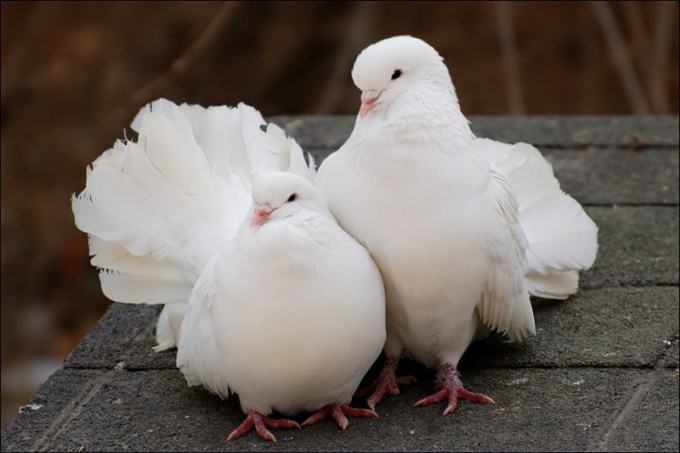Pigeon droppings are rich in nitrogen, phosphorus, potassium, sulfur, magnesium and other valuable elements, so necessary for the growth and development of plants. Thus the phosphorus in it is 8 times more than in horse manure. And nitrogen in this organic fertilizer is over 4 times higher than in horse manure. The composition of manure depends on the food of the bird and its age. On average, one pigeon produces up to 3 kg of manure.
Not recommended to use pigeon droppings are fresh because it is very concentrated and can burn the root system of plants. In addition, fresh organic fertilizer for a long time to decompose, causing possible rotting of the roots and stems of plants. That's why it is better to use prepared (in solution or dried) fertilizer.
Fertilize trees dried droppings in early spring or early autumn: it around each tree and scatter the compost and buried it in 13-15, refer to the Norm for small garden trees: 4 kg of dung. When the fertilizer of vegetable crops under each plant throw a handful of dry pigeon droppings.
Also use of organic manure in the beds can be another way: spread the compost evenly over the entire area and mixed with the upper soil layer. Consumption: 350 g of dry pigeon manure per square meter. Store the dried fertilizer in a cool dry place (moisture has a negative effect: it will lose its valuable properties).
It is believed that pigeon droppings in the form of a solution more effective than dry fertilizer. To properly dilute the fertilizer, take 1 part of pigeon poop and pour 10 parts of water. If desired, fertilizer can be enriched with superphosphate and wood ashes. After the dishes with the solution is placed in 2 weeks in a dark place and watch the fertilizer: if the gas bubbles have ceased to stand out, the fertilizer is ready to use.
It is important to remember that improperly prepared pigeon droppings can cause serious harm to fertilize plants. For feeding do not recommend to use the sediment, it is better with this task will manage the fermented liquid. The concentrated solution is diluted with water in the ratio 1:2 and pour them plants this organic fertilizer can be used under the care of indoor plants).
Such feeding should be conducted in the spring and fall once a week. It is desirable to do in the evening. Immediately after fertilizing the soil watered with clean water.
Not recommended to use pigeon droppings are fresh because it is very concentrated and can burn the root system of plants. In addition, fresh organic fertilizer for a long time to decompose, causing possible rotting of the roots and stems of plants. That's why it is better to use prepared (in solution or dried) fertilizer.
How to use dry pigeon droppings
Fertilize trees dried droppings in early spring or early autumn: it around each tree and scatter the compost and buried it in 13-15, refer to the Norm for small garden trees: 4 kg of dung. When the fertilizer of vegetable crops under each plant throw a handful of dry pigeon droppings.
Also use of organic manure in the beds can be another way: spread the compost evenly over the entire area and mixed with the upper soil layer. Consumption: 350 g of dry pigeon manure per square meter. Store the dried fertilizer in a cool dry place (moisture has a negative effect: it will lose its valuable properties).
The use of pigeon poop as a solution
It is believed that pigeon droppings in the form of a solution more effective than dry fertilizer. To properly dilute the fertilizer, take 1 part of pigeon poop and pour 10 parts of water. If desired, fertilizer can be enriched with superphosphate and wood ashes. After the dishes with the solution is placed in 2 weeks in a dark place and watch the fertilizer: if the gas bubbles have ceased to stand out, the fertilizer is ready to use.
It is important to remember that improperly prepared pigeon droppings can cause serious harm to fertilize plants. For feeding do not recommend to use the sediment, it is better with this task will manage the fermented liquid. The concentrated solution is diluted with water in the ratio 1:2 and pour them plants this organic fertilizer can be used under the care of indoor plants).
Such feeding should be conducted in the spring and fall once a week. It is desirable to do in the evening. Immediately after fertilizing the soil watered with clean water.
